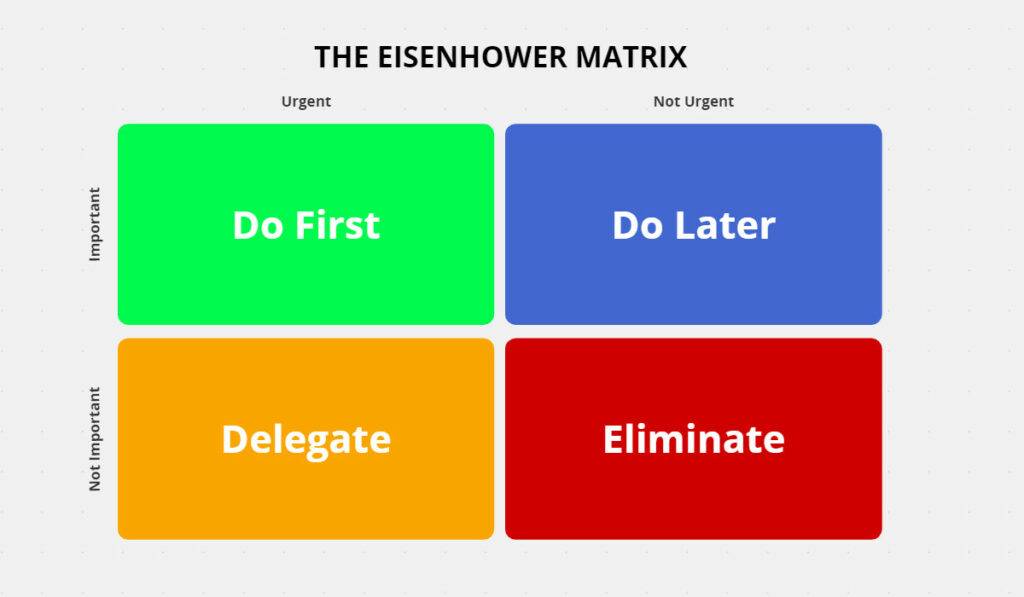How To Manage Your Time? Time management is the process of planning and controlling how much time is devoted to specific activities. Good time management allows a person to complete more in a shorter amount of time, reduces stress, and leads to professional success.
It can help you excel in your studies, shine at work, and feel less stressed daily. But how can you make sure you manage your routine effectively? It’s actually a lot easier than you might think. It comes down to prioritization, planning, and productivity. By teaching you some simple tricks, we’ll show you how to transform your time management skills completely.
Create a daily schedule and stick with it
Don’t even try to start the day without an organized to-do list. make a list of your most urgent tasks for the next day. By putting it all down to paper, or
using a digital calendar, you prevent yourself from staying up at night tossing and turning with tasks going through your brain. If you can’t come the day before, write your list first thing in the morning.
Spend the first 30 minutes of the morning planning your day. It can be helpful to create a game plan for the day in the morning. As soon as you get up, think about what you need to do and indicate approximately when you need to do it. Think about work commitments as well as social commitments and errands. You will find that the time you spend creating a clear plan is nothing compared to the time you waste jumping between tasks when you don’t have such a plan.

Identify times when you’re most productive
Different people are productive at different points during the day. It can help to know when you’re most able to use your time wisely and plan to work during those times. For example, if you find yourself energetic during the mornings, try to get the bulk of your work done then. During the night, you can wind down and do relaxing things you enjoy.
Plan for breaks and interruptions.
No one can work continuously without breaks or interruptions. You can invite occasional interruptions and distractions into your day. This can help plan for such deviations from necessary tasks. This way, interruptions are less likely to take over and derail your day. In addition to small deviations from your work, plan for large breaks or interruptions throughout the day. For example,
- plan to eat lunch for an hour every day at 1 p.m. and watch TV for half an hour after work to relax.
- You can also schedule small breaks during daily tasks. Suppose you are writing an essay. Take five minutes to verify Facebook after 500 words of writing.
Do some weekend work
Weekends are important to unwind, unwind and have fun, so don’t overdo it. However, it can help to work a little on the weekends. Think about the kind of small tasks that pile up over the weekend, making Mondays difficult. For example, you can check and review emails over the weekend and then send some so that you have fewer emails on Mondays.

Find out how you currently spend your time.
To optimize your personal management of time, you must first find out where time is going. Diligently try to access it for a week keeping track of your daily activities. This audit helps you to Determine how much you can get in one day.
Identify the times. Focus on activities that produce maximum performance. When you do this time audit, you’ll get a pretty good idea of how much time you’re wasting on unproductive thoughts, conversations, and activities.
You will have a more accurate idea of how long it takes you to complete certain types of tasks (which will be very useful when performing a later board). This exercise can also help you identify the time of day when you are most productive. That way, you’ll know when to work on your projects that require the most focus and creativity.
Don’t multitask
Many people think that multitasking is a great way to get more done each day and manage time wisely. However, if you focus on multiple tasks, you become less productive. Things will take longer because you are not giving your full attention to anything. Instead, focus entirely on one task at a time. This way you can get your work done faster and make the most of your time.
Minimizing distractions
There are many distractions that waste our time daily for example:
- your phone:
If possible, turn off your phone. Phones can take a lot of time throughout the day which could be used more productively. If it’s easy to log into Facebook or check your email, you’re more likely to do so. Do yourself a favor and turn off your cell phone while you try to do other things.
- Unnecessary browsers:
Many people today rely on their computers or the Internet to do their jobs. Working with Facebook, Twitter or other distracting sites in the background negatively impacts your time management skills. You can also get distracted when tabs open from old projects or irrelevant internet searches. Get in the habit of closing tabs when you’re done with the site. Focus all your attention on the sites you need for your job. so Close unnecessary browsers.
- Social media:
Block social media. Sometimes the temptation to log into Facebook or Twitter is too great to avoid. If you have a problem with social media try to block them and Instead, take time for yourself.
- Avoid interruptions:
The interruptions interrupt the workflow. If you are in the middle of an activity and stop doing something else, it can be difficult to go back to working mode. When you work on an activity, try to complete it before getting up to do something else. Other things may wait as you try to complete something.

Take a break between tasks
When doing a lot of tasks without a break, it is harder to stay focused and motivated. Allow some downtime between jobs to clear your head and refresh yourself. Consider grabbing a brief nap, going for a short walk, or meditating.
Group similar tasks together
Save yourself time and mental energy by trying to complete all of one type of to-do before moving on to the next. For example, create separate chunks of time for answering emails, making phone calls, filing, etc. Don’t answer emails and messages as they come in, as doing so is a distraction at its finest.
Prioritize wisely
When organizing your to-do list, prioritizing is key to effective time management at work. Start by eliminating the activities you shouldn’t be doing in the first place. Then identify the three or four most important tasks and do them first, that way you’ll make sure you get the essentials done. Evaluate your to-do list and make sure you’ve organized it based on the importance of a task rather than its urgency.
Important responsibilities support the achievement of your goals, while urgent responsibilities require immediate attention and are tied to the achievement of other people’s goals. We tend to let urgency dominate when we really need to focus on activities that support our business goals.
To avoid this trap, try one of the work time management tips found in Stephen Covey’s book First Things First. It offers the following time management matrix, known as the Eisenhower matrix, as an organizational tool for prioritizing tasks based on these ideas of importance and urgency.

Here’s a closer look at each of these quadrants:
- Important and urgent:
These tasks have important deadlines with high urgency—complete them right away.
- Important but not urgent:
These items are important but don’t require immediate action and should involve long-term development strategizing. Strive to spend most of your time in this quadrant.
- Urgent but not important:
These tasks are urgent but not important. Minimize, delegate, or eliminate them because they don’t contribute to your output. They are generally distractions that may result from the poor planning of others.
- Not urgent and not important:
These activities hold little if any value and should be eliminated as much as possible.
Learn to say no
You will never learn to manage your time at work if you don’t learn to say no. Only you really know what you have time for. So if you have to decline a request to focus on more important tasks, don’t hesitate to do so. And when you take on a project that is obviously going nowhere, don’t be afraid to let it go.
If you can’t say no, delegate it. Although delegation can be a difficult skill to learn, it can do wonders for your personal time management. You’ve assembled a talented team, so you decide which tasks to transfer.
“The bad news is time flies. The good news is you’re the pilot”
Michael Altshuler
If you desire to get any product that makes your life easier you can check this link:
You can see this video:
How to manage your time more effectively (according to machines) – Brian Christian







